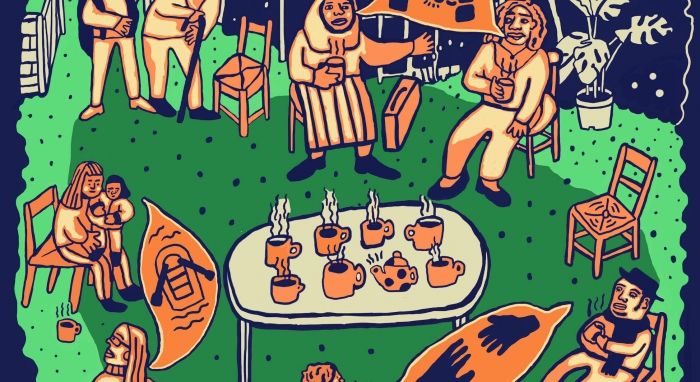Adapted from Monique Jackson for Fine Acts (CC-BY-NC-SA)

New Narratives | A seat at the table
Whether as community activists, NGO workers, or diplomats, most of us who support human rights are involved in putting stories out into the world. Discover our new guide to crafting effective human rights narratives at the UN!
Creating a narrative is like creating a mosaic. Each tile we put down – or story we tell – can be different, but eventually a larger picture – or narrative – starts to form. If we keep laying down tiles of a similar tone, that tone will end up dominating the bigger picture that we want to create. A narrative takes time to form. Many voices and much repetition are required for it to take hold.
Narratives matter
The stories and narratives that are told about human rights defenders at the UN have a major impact on how they are understood and supported on the ground. According to Media Cloud – an open-source platform that tracks the contents of online news – between 1 January 2019 and 3 June 2020, the UN was the forum most associated with human rights defenders. Forty percent of news stories which referenced human rights defenders also referred to the UN.
Over the past 9 months, and together with a team of communications experts and researchers, ISHR has explored perceptions and views that diplomats working at the UN have about human rights and people who defend them.
“Our objective was to understand the messages that best increase support for human rights defenders at the UN,” says ISHR campaign and mobilisation manager Marianne Bertrand, “and to craft more effective human rights narratives to increase support for defenders both at the international level and on the ground”.
We are now ready to share a guide with our findings. This guide is for anyone working within or engaging with the UN system to promote and protect human rights.
“There is growing evidence that hope-based and values-led narratives are most effective in changing people’s hearts and minds and motivating action,” says ISHR communications director Christine Do Phan. “The guide provides practical advice and tips on how to craft and implement a new human rights narrative in general and in particular at the UN”.
Our recommendations
In a nutshell, the guide recommends that:
- the narrative about people who defend human rights should primarily focus on their motivations, achievements and objectives, rather than the dangers and risks they face. Yes, too many of us are facing a grim reality today, but we mustn’t lose sight of our desired destination – the reason we push on and ask others to join us: a better tomorrow.
- we give frequent reminders that we can all contribute to fulfil the promise of human rights – that creating a world in which everyone enjoys freedom, justice, equality and dignity requires a collective effort.
- our stories show what human rights defenders having a seat at the table looks like, whether that’s a corporate board table, a conflict resolution and peacebuilding roundtable, or the speakers’ table in Room XX at the Palais des Nations. The participation and inputs of defenders are essential to identify problems and ensure that solutions are informed and influenced by the communities concerned.
We can all help cultivate narratives that are beneficial to human rights and the people who defend them. We want to create a picture that showcases the impact achieved and improvements delivered when people promote human rights, that demonstrates the benefits of ensuring these people’s essential voices are heard, and encourages everyone to play their part in creating a fairer world.
“Our narratives need to be our own. We must tell our own stories, not be minor characters in stories about our opponents,” says Tom Clarke, human rights campaigner, communications specialist and guide co-author. “Don’t march to the beat of their drums, it’s time we got better at dancing to our own music.”
“We’re not suggesting that our stories should ignore the many and serious dangers faced by people who promote and protect human rights,” adds Sophie Mulphin, human rights communications specialist and guide co-author, “but we want to make sure violations don’t overshadow the inspiring stories about our shared motivations, successes and positive visions and ideas for creating a better future”.
There are no hard and fast rules when it comes to narrative and messaging work, but we hope the ideas and principles in this guide prove useful.
Join us!
All of us who seek to protect and advance human rights should reflect on the stories we tell and how we can make them more effective in motivating positive change. Together we can also make a point of looking out for and helping to disseminate stories of successful human rights campaigns and reform. Please contact our team with any feedback or ideas, as our efforts to refine and sharpen our strategic messaging is ongoing.
Much like the promotion and realisation of human rights, shifting narratives takes time and is an ongoing collective effort. Thank you for being part of it!
Download as PDF